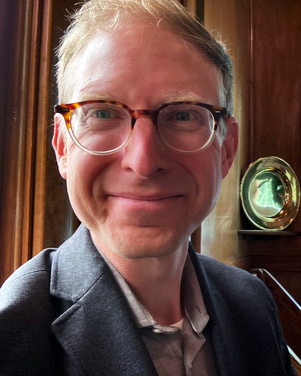A couple of weeks before Christmas, I stopped by an acquaintance’s house to drop off a gift. Before I reached the steps, the door was open, and there he stood. “Think you could sneak up on me?” he asked. “I didn’t think I had to,” I countered, “I was just going to ring the doorbell.” I climbed the three stairs to the landing and walked to the door, handing him the gift. He offered a curt “thanks” as he invited me in.
It had been a few weeks since we’d had a chance to connect, and it was good to sit down. I asked about a project he was working on, and he asked me about my trip to Montreal earlier in the fall. We talked—as we often do—about institutional change, mental health, and burnout. These issues are endemic in the worlds we inhabit. And so we bantered back and forth for a while before the conversation took an unexpected turn.
“Do you know what your purpose is?” he asked. “What is your ‘why’?”
I stumbled and stuttered, mumbling a bit of a “yes, and well it’s complicated, but generally yes, a sense of my call and purpose, I’ve got that.”
“What you’re telling me is you don’t know. You don’t have a purpose. You don’t know why you do what you’re doing. If you knew, you could tell me without thinking about it.” I sat there stunned. I’d come to drop off a gift and now found myself under interrogation.
“Let me put it this way,” he continued. “You’re walking down the street and a guy jumps out of the trees. He jams a .45 under your chin. How do you respond?”
Ashes to ashes. Dust to dust.
If I was an action hero used to shooting from the hip—a James Bond or Sterling Wesley—maybe I’d respond with acerbic clarity, colourful sass, or my unique combination of the two. My acquaintance is ex-military. Me, not so much. I’ve never been in this kind of life-or-death situation before. I don’t know what I’d do. Even as Jesus calls us to “take up the cross,” I often live as though this is some distant abstraction.
In the days that followed—this rather unexpected and unwelcome encounter—I found myself called into deep personal reflection.
Looking back, I have an overall sense of where I’ve been. I have a sense of the trajectory of my life to date. There have been signposts along the way, and communities of faithfulness helping me navigate my own mobilization into the Jesus movement. Those beginning reflections weren’t good enough for the fictitious assassin my host had just invoked.
Perhaps this is nothing more than a delay tactic, but as we enter Lent, I’ve started thinking about this question as it applies to the church. As a diocese, do we have a clear sense of what God is calling us to? Do we have a united sense of our purpose in this world? What legacy will we leave?
How might we answer these same questions in our parishes and worshipping communities, let alone the whispered conversations amongst the disenchanted and disaffected on the margins of the church. Who are we? What is our purpose? And, if we know this purpose, how does our collective action reflect and embody that purpose in the world?
In what ways is God calling us to unrepentantly follow in the way of Jesus? How might we boldly proclaim the good news of God’s kingdom? How might we teach, nurture, and baptize new believers? How might we sacrificially respond to the needs of our neighbours in loving service? How might we doggedly fight to transform the unjust structures of our church and society; that we might challenge and end violence of every kind? How might we joyfully strive to defend the integrity of God’s beloved Creation, sustaining and renewing the life of this earth, our island home?
In what concrete ways will we allow the prompting of the Holy Spirit to transform us and our communities so that God’s love ripples forth from the Altar, ripples forth from the gathered community, to participate in bringing healing transformation to a world in deep fracture and pain?
We don’t have to do it all. We don’t have to do more with less, or even do less with less. But we ought to examine our priorities and ask if what we are doing is in line with our purpose as a congregation. We are called to live in faithful response to Jesus, of course. And sometimes that may mean focusing on one or two areas of ministry that will allow us to live into our deep purpose.
In our communities, some may be tired, others may be ready to step aside. Perhaps that is a next faithful step for them, allowing new energy; and vision the opportunity to emerge. If, as local Christian communities, we discern that there is little more we have energy to do, perhaps we might come together and discern ways for our congregation’s legacy to bless future generations of Christians—even those we have not yet met—who will pick up the torch from us knowing that in Christ, there is life on the other side of death. The story of Jesus is bigger than any one of us.
Staring my host and fictitious attacker in the eye, I think I’m coming to some more clarity. My own purpose is to let people know that they are enough in God’s eyes—beloved from the very start—and to help the church to more faithfully embody this reality in its common life. That’s more clarity than I’ve had in a while.
This has looked and will look different at different times in my life, but as I look back, this is the thread I can see. I pray with my heart and with my actions for a church unwavering in our faithfulness to God. I pray for a church bold in discipleship. I pray for a church that seeks justice both within and in the world of which we are a part. I pray for a church that has the capacity to welcome and bind up the wounded and broken-hearted, to live a communal life that embodies deep care for those society rejects.
To become such a church, our way of being may at first look different than it has for the past fifty years. We may need to die to many of the externalities we once thought were core to being church. In short, in this time and place, we are being called to surrender our very lives into the hands of the Creator. For it is ultimately the Good Shepherd who will lead us through the valley of shadows that we might experience life now and in the days to come.




